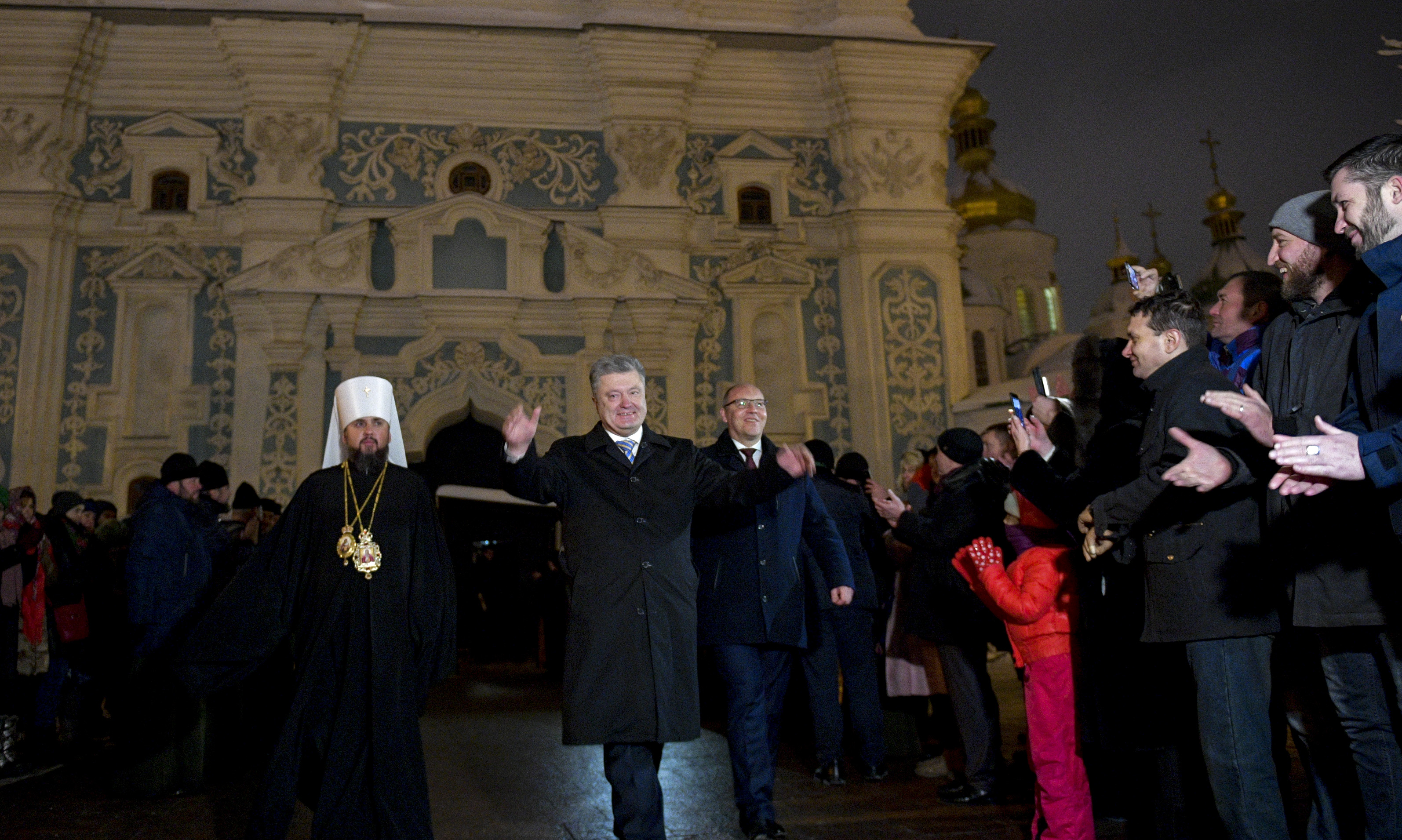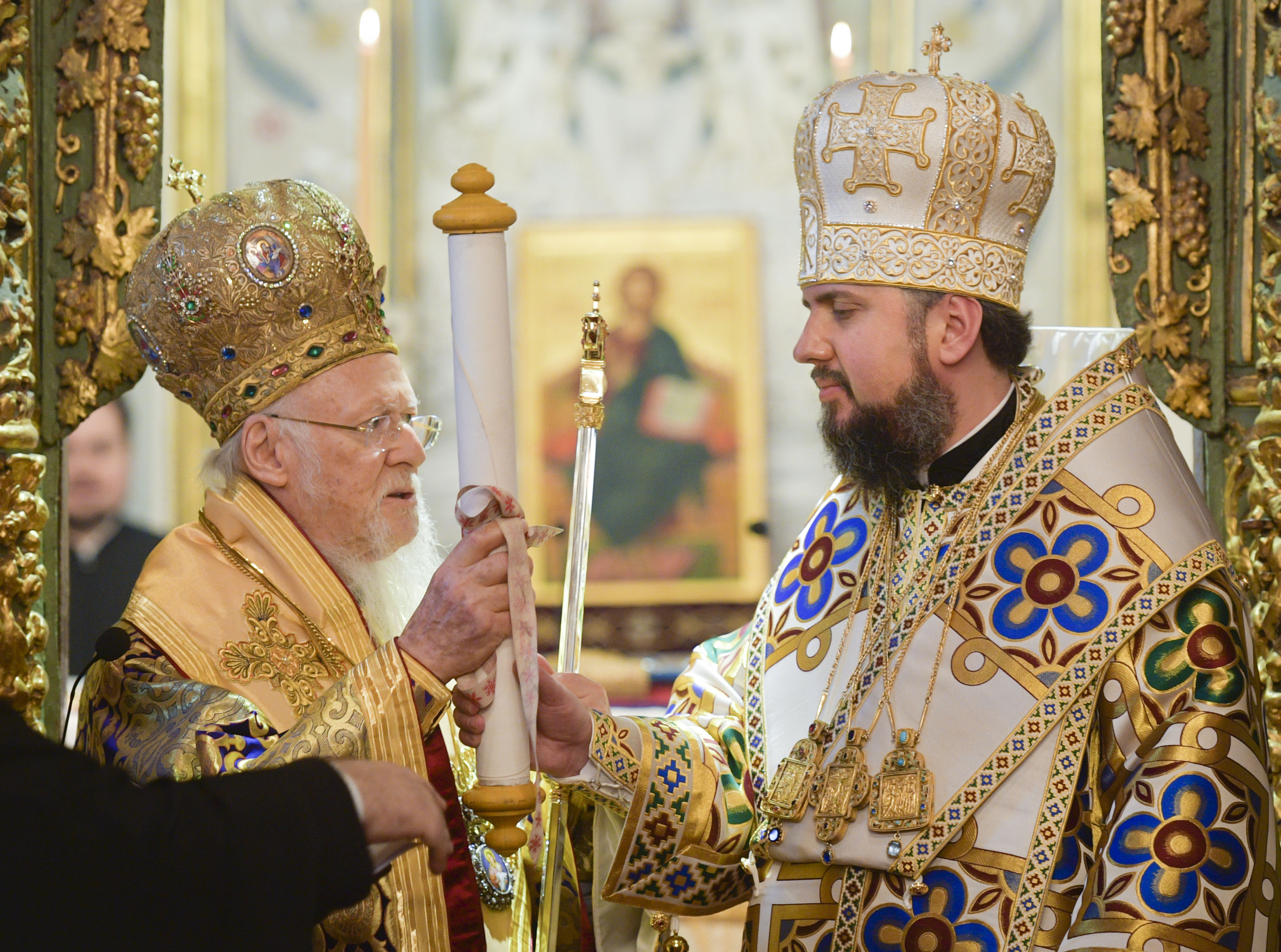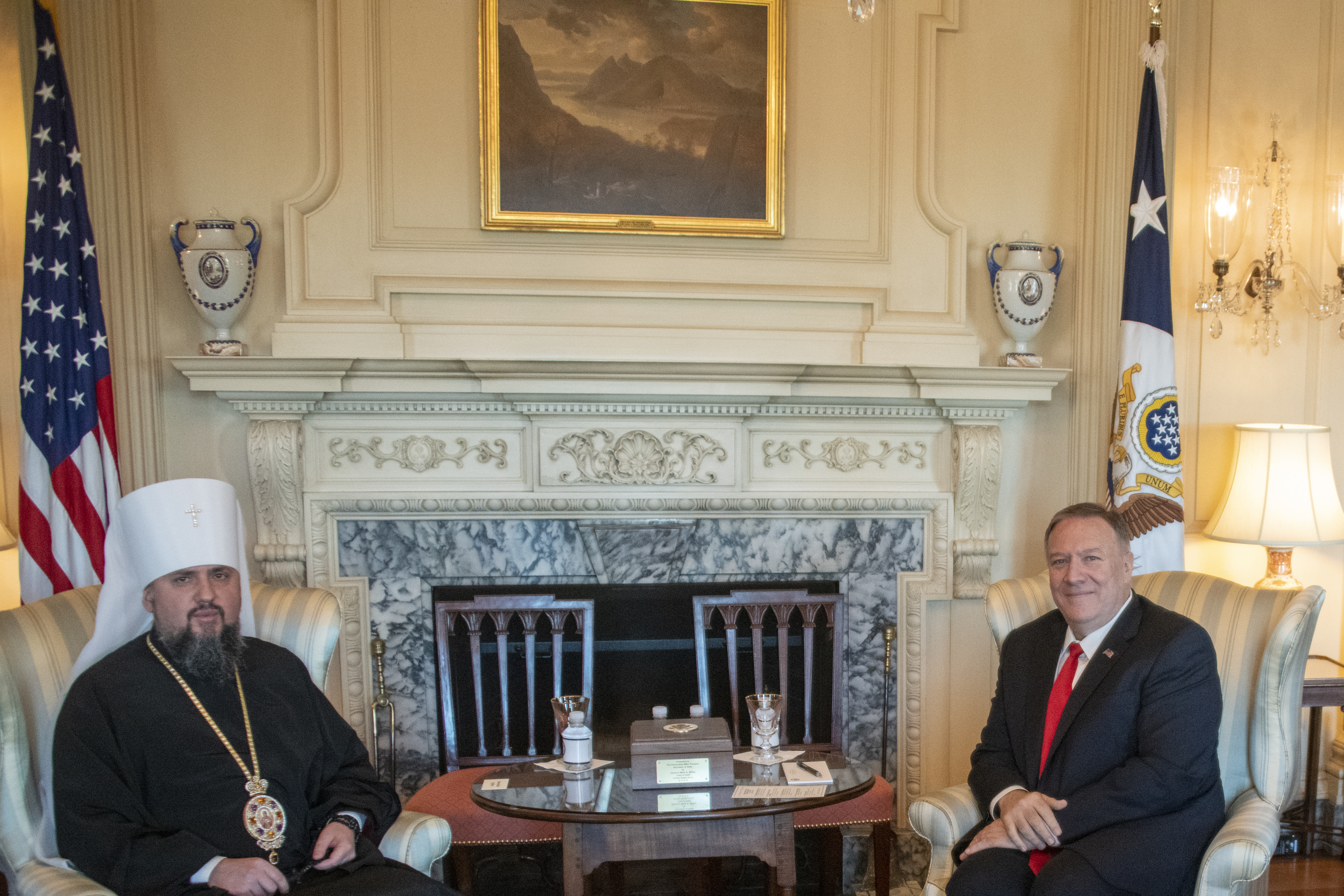1. Early life and education
Serhiy Petrovych Dumenko's formative years laid the groundwork for his future ecclesiastical and academic career, encompassing his birth, childhood, and extensive educational journey.
1.1. Birth and childhood
Serhiy Petrovych Dumenko was born on 3 February 1979, in Vovkove, Berezivka Raion near Odesa, Ukraine. He spent his childhood and school years in the village of Stara Zhadova in Storozhynets Raion of Chernivtsi Oblast. In 1996, he graduated from high school in Stara Zhadova.
1.2. Education and theological training
In 1996, he enrolled in the Kyiv Theological Seminary, graduating with first-class honors in 1999. The same year, he entered the Kyiv Theological Academy, where he earned a doctoral degree in 2003, successfully defending his PhD thesis on "Formation of church-canonical collections in the Donician period and their characteristics." From 2006 to 2007, he undertook an internship in the Faculty of Philosophy at the Athens National University in Greece. On 30 August 2012, he was awarded a Doctor of Theology degree after defending his doctoral dissertation on "Doctrine of the Orthodox Church on salvation in the context of the continuity of the Holy Fatherland."
2. Ministry
Metropolitan Epiphanius's ecclesiastical career progressed through various significant roles within the Ukrainian Orthodox Church - Kyiv Patriarchate, from his initial ordination to prominent leadership and academic positions.
2.1. Ordination and early pastoral service
From 1 July 2003 to 31 December 2005, he served as the secretary-referent of the Rivne diocesan administration and personal secretary to the Metropolitan of Rivne and Ostroh. During this period, from 26 August 2003 to 31 December 2005, he also taught at the Rivne Seminary and held the position of senior assistant inspector. He led the "Rivne Pravoslavne" (Рівне ПравославнеRivne OrthodoxUkrainian) Internet portal and was a member of the editorial board for the religious newspaper Dukhovna Nyva (Духовна НиваSpiritual fieldUkrainian). In December 2005, he was admitted to the National Union of Journalists of Ukraine.
2.2. Activities within the Ukrainian Orthodox Church - Kyiv Patriarchate
Since the academic year 2007, he served as a teacher at the Kyiv Orthodox Theological Academy and was appointed head of the philology department. On 21 December 2007, with the blessing of Patriarch Filaret, he received a tonsure as a monk at the Michael's Golden-Domed Monastery, adopting the monastic name Epiphanius in honor of Epiphanius of Cyprus. He was ordained hieromonk by Filaret on 20 January 2008. Later that month, on 25 January, he was appointed secretary to the Patriarch of Kyiv and All Rus'-Ukraine, Filaret. In March 2008, he was ordained an archimandrite at St. Volodymyr's Cathedral and subsequently appointed governor of Vydubychi Monastery in Kyiv on 20 March. On 30 May 2008, he became the manager of affairs for the Kyivan Patriarchate, and on 7 October 2008, he was awarded the title of Associate Professor of the Kyiv Orthodox Theological Academy. On 21 October 2009, the Holy Synod of the UOC-KP elected him Bishop of Vyshhorod, vicar of the Kyiv diocese, and he was ordained a bishop on 15 November 2009. By decision of the Holy Synod of the UOC-KP on 27 July 2010, he was appointed rector of the Kyiv Orthodox Theological Academy and governor of the Pereiaslav-Khmelnytsky diocese. He was awarded the title of professor of the Kyiv Orthodox Theological Academy on 17 November 2011. On 23 January 2012, he was promoted to the rank of Archbishop. The Bishops' Council of the UOC-KP on 28 June 2013 raised him to the rank of Metropolitan of Pereiaslav-Khmelnytskyi and Bila Tserkva, appointing him patriarchal governor with the rights of the diocesan bishop. On 13 December 2017, he was named Metropolitan of Pereiaslav and Bila Tserkva.
3. Primate of the Orthodox Church of Ukraine
This section details Metropolitan Epiphanius's leadership of the autocephalous Orthodox Church of Ukraine, from his election to his current activities and challenges, including the historical context of the OCU's establishment and its evolving relations within the Orthodox world.


3.1. Election and establishment of the OCU
On 15 December 2018, at the unification council held in the Cathedral of St. Sophia, Metropolitan Epiphanius was elected the first Primate of the newly unified and autocephalous Orthodox Church of Ukraine (OCU), holding the title of Metropolitan of Kyiv and All Ukraine. This historic election marked the merger of the Ukrainian Orthodox Church - Kyiv Patriarchate and the Ukrainian Autocephalous Orthodox Church. Following this, Patriarch Filaret, who had been the Primate of the Ukrainian Orthodox Church - Kyiv Patriarchate, transitioned to the role of "honorary patriarch" of the newly established OCU. The official name of the primate of the Orthodox Church of Ukraine is "His Beatitude (name), Metropolitan of Kyiv and all Ukraine".
3.2. Reception of the Tomos of Autocephaly

On 5 January 2019, Ecumenical Patriarch Bartholomew and Metropolitan Epiphanius held a liturgy in St. George's Cathedral in Istanbul. Following the liturgy, the tomos of autocephaly for the Orthodox Church of Ukraine was signed in the same cathedral, officially coming into force at the moment of its signing. This act formally established the autocephalous Orthodox Church of Ukraine. After the signing, Metropolitan Epiphanius delivered a speech, acknowledging the significant role of then-President Petro Poroshenko, stating that Poroshenko's name would "forever go down in the history of the Ukrainian people next to the names of the rulers, of our prince Volodymyr the Great, Yaroslav the Wise, Kostyantyn Ostrozky and Hetman Ivan Mazepa". On 6 January, after a liturgy celebrated by Metropolitan Epiphanius and Patriarch Bartholomew, Patriarch Bartholomew publicly read the tomos and formally presented it to Metropolitan Epiphanius. The tomos was then brought back to Istanbul on 8 January 2019, for all members of the Holy Synod of the Ecumenical Patriarchate to sign it, which they did on 9 January 2019. The fully signed tomos was returned to Ukraine on the morning of 10 January 2019.
3.3. Enthronement and early church governance
Metropolitan Epiphanius's enthronement was scheduled for 3 February 2019, coinciding with his 40th birthday. This event was planned to be followed by the first synod of the OCU. While the monasteries of Mount Athos generally decline invitations to enthronement ceremonies, two abbots from Mount Athos were expected to attend as part of the Ecumenical Patriarchate's delegation. However, on 1 February, Archimandrite Ephrem, one of the Athonite abbots, was hospitalized in Kyiv due to a heart attack; Metropolitan Epiphanius visited him on 2 February. As planned, Epiphanius was enthroned on 3 February 2019, in St. Sophia's Cathedral, Kyiv. Filaret was unable to attend due to health conditions but sent his written congratulations, which were read at the end of the liturgy. Archimandrite Ephrem was also absent, but a hieromonk from his monastery and a monk from the Koutloumousiou Monastery were present at the ceremony. The first meeting of the Holy Synod of the OCU took place on 5 February 2019, where its composition was defined and initial decisions were made.
3.4. Commemoration of the Patriarch of Moscow
On Sunday, 16 December 2018, during his first Divine Liturgy as Metropolitan of the OCU following his election, Epiphanius called for prayers for peace and unity in Ukraine. Notably, during this liturgy, he omitted Patriarch Kirill of Moscow from the list of brother primates with whom he is in communion, who are traditionally commemorated at the Great Entrance. Metropolitan Epiphanius later explained this decision in an interview, stating, "At the moment I do not commemorate him [the Patriarch of Moscow] because we are in a state of war, so the Ukrainian people would not accept if the newly-elected primate commemorated the name of the Russian Patriarch." However, during the Divine Liturgy on 7 January 2019, after the OCU received its official autocephaly, Metropolitan Epiphanius did commemorate Patriarch Kirill during the Great Entrance. He later clarified that he did so at the instruction of the Ecumenical Patriarch, despite Filaret having instructed him not to mention Kirill.
3.5. Relations with Patriarch Filaret
A significant conflict emerged between Filaret and Metropolitan Epiphanius, primarily stemming from disagreements regarding the model of church governance, the management of the diaspora, and the official name and statute of the OCU. Filaret asserted that an agreement reached at the unification council stipulated that the primate would be responsible for the external representation of the Ukrainian Orthodox Church, while the patriarch would oversee internal church life in Ukraine, in cooperation with the primate. According to Filaret, the primate was not to act without the patriarch's consent, and the patriarch would chair meetings of the Holy Synod and other church gatherings to maintain unity and promote growth. Filaret contended that this agreement had not been fulfilled, leading to a period of tension and public disagreement between the two leaders.
3.7. Role during the Russo-Ukrainian War
Following the full-scale Russian invasion in February 2022, Metropolitan Epiphanius demonstrated resolute leadership. Archbishop Daniel of the Ukrainian Orthodox Church of the USA reported that Epiphanius planned to remain in Ukraine amidst the fighting. As Primate, he issued a direct appeal to his Russian counterpart, Kirill of Moscow, urging him to facilitate the removal of the bodies of Russian soldiers killed in Ukraine and questioning Kirill's loyalty to Russian President Vladimir Putin. Metropolitan Epiphanius consistently condemned Russia's actions, appealing to the international community for assistance and support, and even suggested a second Nuremberg trials for the prosecution of crimes committed against Ukraine. He, along with other local bishops, actively transformed their churches into shelters for civilians seeking refuge from bombings. He reiterated his plea to Patriarch Kirill regarding the repatriation of fallen Russian soldiers, emphasizing the human cost of the conflict. Metropolitan Epiphanius also publicly stated that he was considered "target No. 5" on a Russian kill list, highlighting the personal risk he faced due to his leadership and anti-war stance.
5. Awards and honors
Metropolitan Epiphanius has received significant recognition for his religious, academic, and public service, including both ecclesiastical and state awards, as well as international accolades.
5.1. Ecclesiastical and State Awards
From the church, he has been awarded the Order of the Holy Apostle and Evangelist John the Theologian, the Order of the Holy Equal-to-apostles Knyaz Volodymyr the Great of the Third Degree, the Order of the Holy Archangel Michael, and the Order of the Holy Cross of the Montenegrin Orthodox Church. State recognition includes the Order of Merit of the II and III degrees. He has also received a letter of the Cabinet of ministers of Ukraine, thanks from the Prime Minister of Ukraine, and a letter from the Verkhovna Rada of Ukraine. Additional decorations include those from the Ministry of Defense of Ukraine, the Ministry of Internal Affairs of Ukraine, and the command of the Army of Ukraine. He has also received distinctions from the National Pedagogical Dragomanov University and the Ukrainian People's Embassy.
5.2. Academic and International Recognition
In March 2019, he was named an Honorary doctor of the National Pedagogical Dragomanov University. Internationally, he was honored with the 2019 Athenagoras Human Rights Award, recognizing his broader impact on human rights.
6. Assessment and Impact
Metropolitan Epiphanius's leadership and the establishment of the Orthodox Church of Ukraine have had a profound impact on the national and international stage, influencing religious, social, and political spheres.
6.1. Religious and National Significance
Metropolitan Epiphanius's leadership has been pivotal in consolidating the autocephalous status of the Ukrainian Orthodox Church, a move of profound religious and national significance. The establishment of the OCU under his guidance has contributed substantially to strengthening Ukrainian national identity and statehood, providing a spiritual foundation independent of external ecclesiastical influence. This development is seen as a crucial step in Ukraine's assertion of sovereignty and its cultural distinctiveness.
6.2. International Relations and Recognition
The Orthodox Church of Ukraine, under Metropolitan Epiphanius, has navigated complex international relations within the global Orthodox communion. Its autocephalous status, granted by the Ecumenical Patriarchate, has reshaped the Orthodox landscape, leading to diplomatic engagements with other churches and international bodies. While some Orthodox churches have recognized the OCU, others, particularly those aligned with the Russian Orthodox Church, have not, leading to ongoing inter-church dialogue and challenges. Despite these complexities, the OCU's independence under Epiphanius represents a significant shift in the balance of power within Eastern Orthodoxy and a testament to Ukraine's pursuit of religious self-determination.
